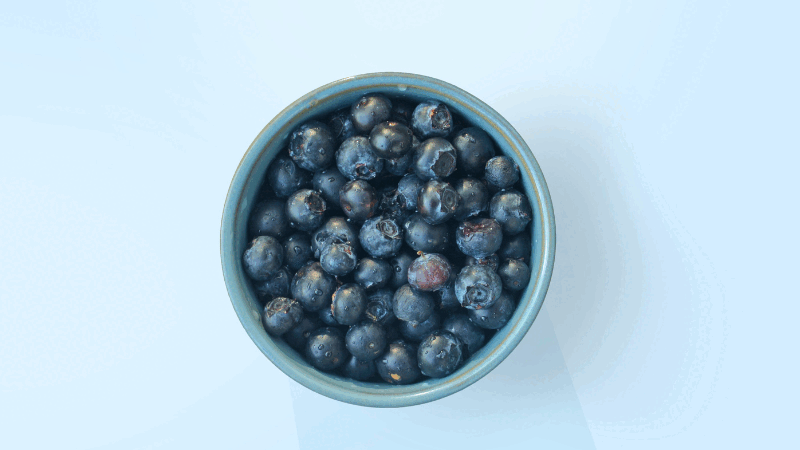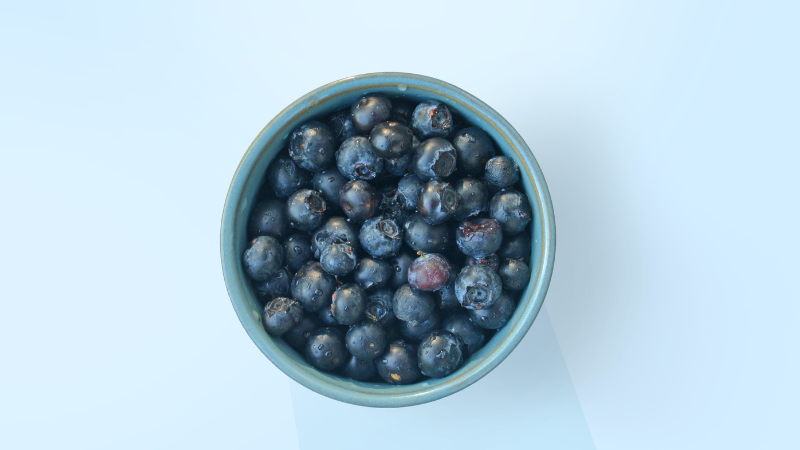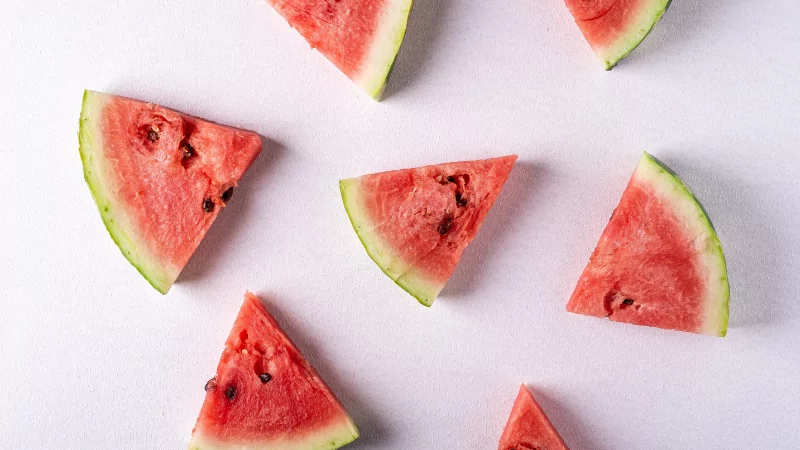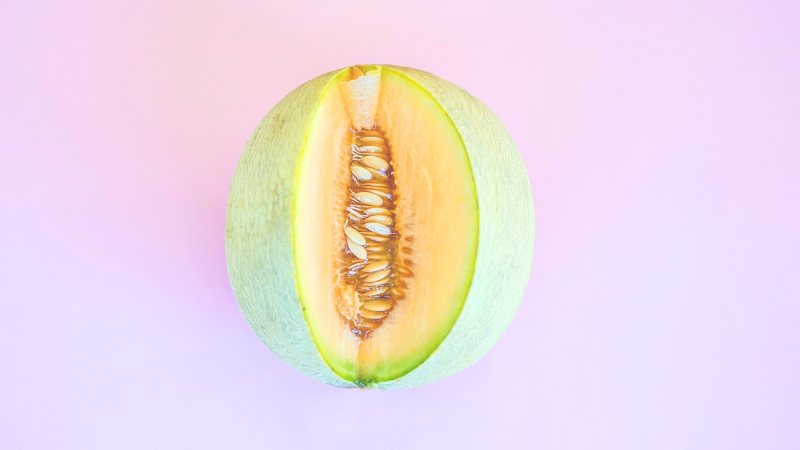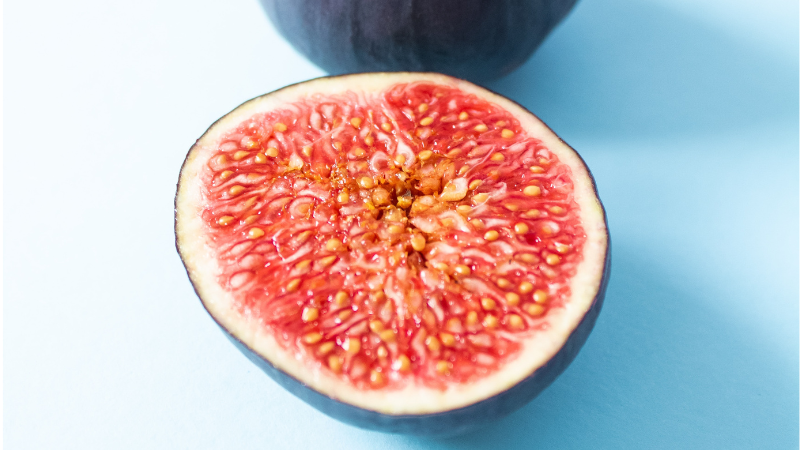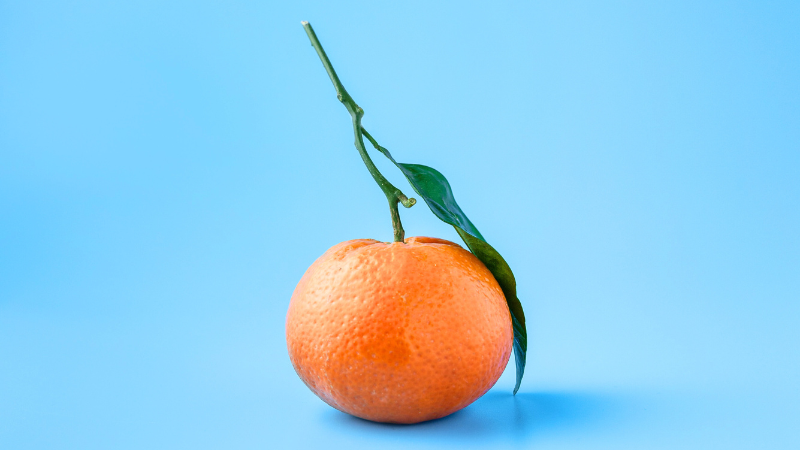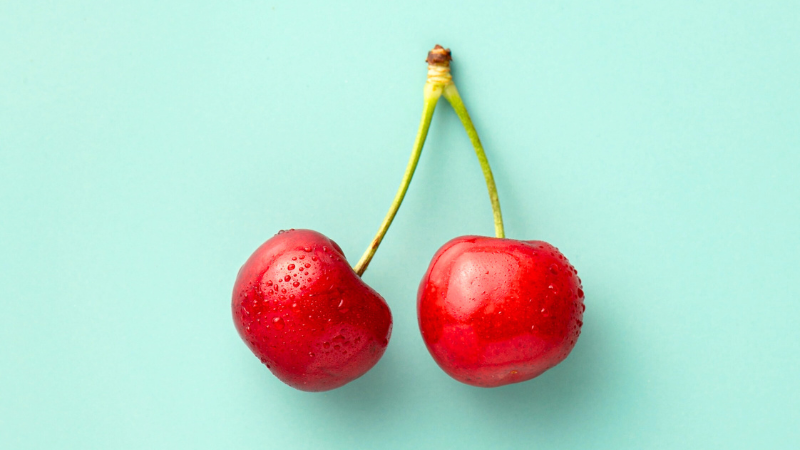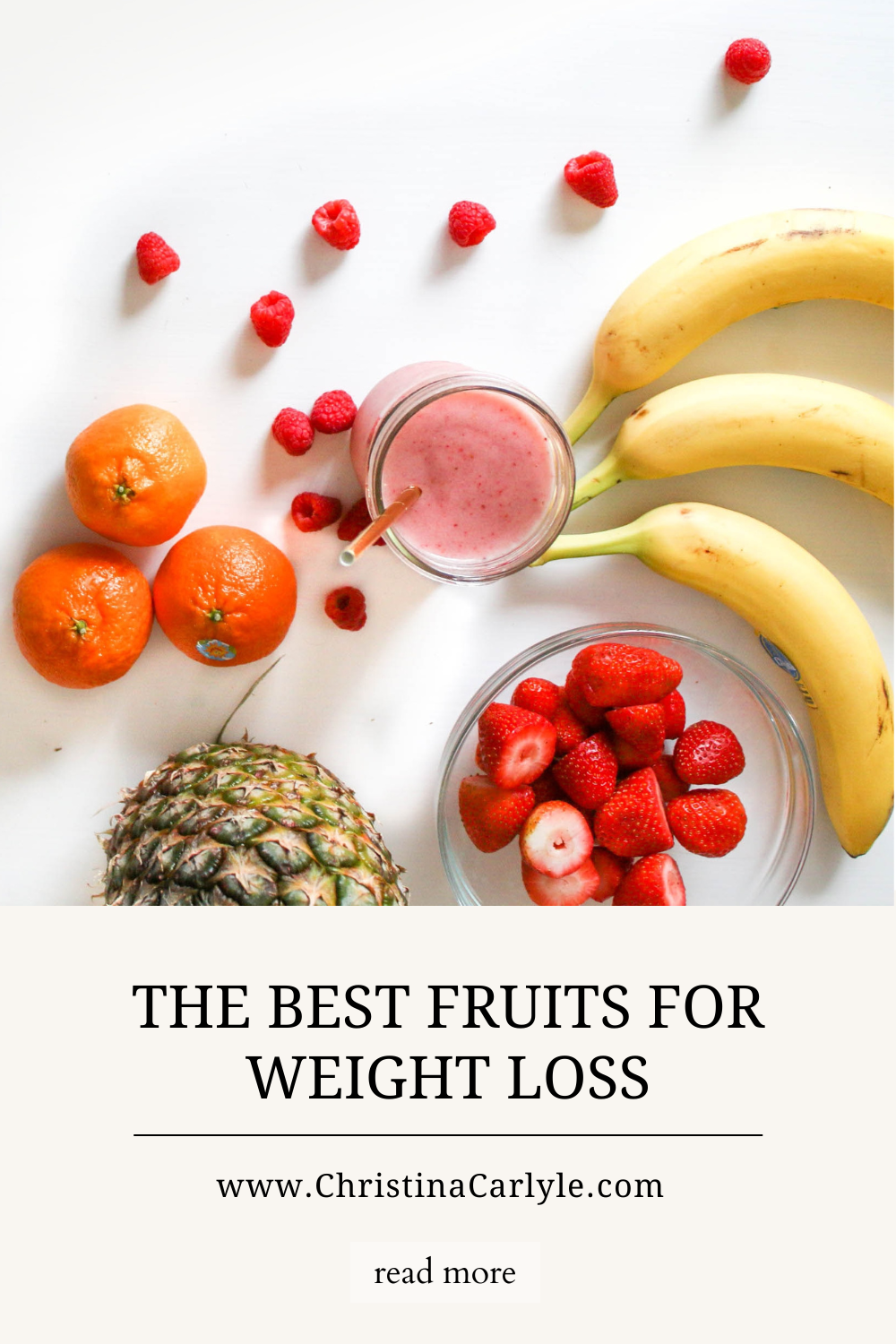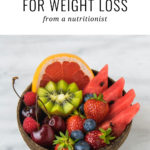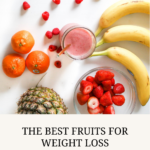Last Updated on April 4, 2024
It’s very common for me to get asked questions like, is what are the best fruits for weight loss and is fruit ok if you’re trying to lose weight?
So I’m going to break down the best fruits for weight loss and give you lists of the fruits lowest in calories, fruits lowest in sugar, and
THE BEST FRUITS FOR WEIGHT LOSS
When it comes to weight loss, fruits are a great choice for weight loss as they’re generally low in calories, high in fiber and nutrients, and provide a natural source of sweetness that can help reduce cravings for unhealthy sweets.
A lot of people think that fruit isn’t good for weight loss or that fruit can make you fat.
Some of the most common reasons why people might mistakenly think that fruit is bad for weight loss:
- Sugar Content: Some may be concerned about the sugar content in fruits. While fruits do contain natural sugars, they also provide essential vitamins, minerals, fiber, and antioxidants. The sugar in fruit is different from added sugars found in processed foods. The fiber in fruits helps slow down sugar absorption and can contribute to feelings of fullness, making it easier to manage overall calorie intake.
- Misinformation: Misinformation or misconceptions about carbohydrates and weight loss can lead people to believe that all carbohydrates, including those from fruits, should be avoided. However, not all carbohydrates are created equal. Fruits contain valuable nutrients, phytochemicals, enzymes, and fibers that are needed as a part of a healthy, balanced diet.
- Calorie Concerns: Some worry that the natural sugars and calories in fruit will hinder their weight loss efforts. While fruits do contain calories, they also contain essential nutrients and fiber content so they can help you feel satisfied and won’t cause blood sugar spikes as badly as processed sugars can. Incorporating fruits into a well-rounded meal plan can contribute to a feeling of fullness and provide important nutrients while still supporting weight loss goals. If you’re craving something sweet, I always recommend eating fruits.
- Overconsumption: If someone consumes excessive amounts of fruit without considering their overall calorie intake, it is possible to exceed calorie goals. While fruits are nutritious, it’s essential to practice portion control and consume a variety of foods to maintain a balanced diet. Moderation and portion awareness are key. But eating fruit won’t cause cravings & hunger like processed sugars can.
- Added Ingredients and Pairings: Fruit-based desserts, canned fruits in syrup, and fruit products with added sugars or fats can contribute to weight gain. These added ingredients increase the calorie content of the fruit and can negate the potential weight loss benefits. Opting for whole, fresh fruits or frozen fruits without added ingredients is generally a better choice.
Some fruits are definitely better than others for weight loss when considering their calories/serving, nutrient profile, and sugar content.
So here are the best fruits for weight loss ranked accordingly.
After you’ve had a chance to check out the lists, keep reading for more helpful tips to eat fruit for maximum weight loss and wellness benefits.
Top 20 Best Fruits for Weight Loss
Ranked by calories, nutrients, and sugar content:
- Berries (Strawberries, Blueberries, Blackberries, Raspberries) – Berries are low in calories and high in fiber, antioxidants, and vitamin C. They also have low sugar content, making them a great option for weight loss.
- Grapefruit – Grapefruit is low in calories and high in fiber and vitamin C. It has been shown to help with weight loss by reducing insulin levels and increasing metabolism.
- Apples – Apples are high in fiber and vitamin C and low in calories. They also contain antioxidants and phytochemicals that have been shown to help with weight loss.
- Watermelon – Watermelon is low in calories and high in water content, making it a great choice for weight loss. It is also a good source of vitamin C and lycopene.
- Kiwi – Kiwi is low in calories and high in fiber, vitamin C, and potassium. It also has a low glycemic index, which means it won’t cause a spike in blood sugar levels.
- Oranges – Oranges are low in calories and high in fiber and vitamin C. They also contain antioxidants and phytochemicals that have been shown to help with weight loss.
- Pears – Pears are low in calories and high in fiber. They also contain antioxidants and phytochemicals that have been shown to help with weight loss.
- Papaya – Papaya is low in calories and high in fiber, vitamin C, and antioxidants. It also contains an enzyme called papain, which can aid in digestion and help with weight loss.
- Guava – Guava is low in calories and high in fiber, vitamin C, and antioxidants. It also contains potassium, which can help regulate blood pressure.
- Cherries – Cherries are low in calories and high in fiber and antioxidants. They also have a low glycemic index, making them a good option for weight loss.
- Pineapple – Pineapple is low in calories and high in vitamin C and bromelain, an enzyme that aids in digestion and can help with weight loss.
- Mango – Mango is low in calories and high in fiber, vitamin C, and beta-carotene. It also contains an enzyme called amylase that can help with digestion and weight loss.
- Apricots – Apricots are low in calories and high in fiber, vitamin A, and potassium. They also have a low glycemic index, making them a good option for weight loss.
- Peaches – Peaches are low in calories and high in fiber, vitamin C, and potassium. They also contain antioxidants that can help protect against cancer and other diseases.
- Plums – Plums are low in calories and high in fiber and antioxidants. They also contain vitamin C and potassium, which can help regulate blood pressure.
- Grapes – Grapes are low in calories and high in fiber and antioxidants. They also contain resveratrol, a compound that has been shown to help with weight loss.
- Cantaloupe – Cantaloupe is low in calories and high in vitamin C and beta-carotene. It also contains potassium, which can help regulate blood pressure.
- Lemon – Lemon is low in calories and high in vitamin C and antioxidants. It also contains citric acid, which can help with digestion and weight loss.
- Tangerines – Tangerines are low in calories and high in fiber and vitamin C. They also contain flavonoids, which can help protect against cancer and other diseases.
- Cranberries – Cranberries are low in calories and high in fiber and antioxidants. They also contain proanthocyanidins, which can help prevent urinary tract infections and other diseases.
Keep in mind that while these fruits are generally lower in sugar and higher in nutrients, the nutrient content can vary depending on factors such as ripeness, growing conditions, and preparation method.
Remember, portion size and frequency of consumption should be taken into consideration as part of a balanced and healthy diet.
20 Low Caloire Fruits
Here are the top 20 fruits ranked from lowest in calories to highest. The calorie count is approximate.
- Watermelon – 1 cup of diced watermelon = 46 calories
- Plums – 1 medium plum = 46 calories
- Tangerines – 1 medium tangerine = 47 calories
- Strawberries – 1 cup of whole strawberries = 49 calories
- Grapefruit – 1/2 medium grapefruit = 52 calories
- Cantaloupe – 1 cup of diced cantaloupe = 53 calories
- Peaches – 1 medium peach = 58 calories
- Kiwi – 1 medium kiwi = 61 calories
- Oranges – 1 medium orange = 62 calories
- Nectarines – 1 medium nectarine = 62 calories
- Blackberries – 1 cup of blackberries = 62 calories
- Raspberries – 1 cup of raspberries = 64 calories
- Honeydew melon – 1 cup of diced honeydew melon = 64 calories
- Papaya – 1 cup of diced papaya = 67 calories
- Pineapple – 1 cup of diced pineapple = 82 calories
- Blueberries – 1 cup of blueberries = 84 calories
- Cherries – 1 cup of cherries = 87 calories
- Apples – 1 medium apple = 95 calories
- Mango – 1 cup of diced mango = 99 calories
- Pears – 1 medium pear = 101 calories
20 Low Sugar Fruits
Here’s a list of 20 fruits that are low in sugar and are ranked low on the glycemic index.
The Glycemic Index is a measure used to determine how much a food can affect blood sugar levels. The glycemic index ranks foods from 0-100. The lower the score the better it is. The higher the score, the more you should limit intake. Several factors affect the glycemic index of a food, including the nutrient composition, ripeness, cooking method, and amount of processing it has undergone.
These are the best fruits for weight loss because they’re highest in beneficial nutrients but low in calories… Ironically the first thing on the list that’s lowest in sugar is highest in calories due to its fat content.
After looking at this list you may be surprised to learn that some of the things on the list actually are fruits… a fruit doesn’t have to be sweet… also a fruit can be low in sugar but still high on the glycemic index.
- Avocado
- Olives
- Tomatoes
- Cucumber
- Lemon
- Lime
- Grapefruit
- Apricots
- Peaches
- Plums
- Strawberries
- Raspberries
- Blackberries
- Blueberries
- Kiwi
- Watermelon
- Cantaloupe
- Papaya
- Honeydew melon
- Guava
These fruits are generally lower in sugar and have a lower glycemic index compared to other fruits, making them a good choice for people who want to manage their blood sugar levels or are following a low-sugar diet. However, it’s important to note that individual blood sugar responses can vary.
You might not think of avocados, olives, tomatoes, and cucumbers as a fruit, but they actually have more in common with fruits than with other vegetables.
According to the botanical definition, a fruit is anything that’s produced from a flower which is the mature ovary of a plant. And because these ‘vegetables’ all grow from flowers they are technically fruits.
Avocado is the only fruit that has protein and fat. In a pinch, avocados make a great, filling, snack.
HOW FRUCTOSE (FRUIT SUGAR) CAN AFFECT WEIGHT
Fructose is a type of sugar found naturally in fruits and honey. Fructose is often used as an added sugar in processed foods and beverages. When it comes to weight, fructose can have an effect.
There are several factors to consider to determine if fructose will affect your weight or not:
- Calorie Content: Fructose, like any other sugar, contains calories. Consuming excessive calories from any source, including fructose, can lead to weight gain. Weight gain occurs when the overall calorie intake exceeds the calories burned by the body. 1 medium sized banana = approximately 105 calories. So if you eat 20 bananas, that’s 2100 calories from sugar. This amount of calories and sugar isn’t ideal for weight loss. You’re always going to have a hard time losing weight if you’re not getting the right nutrients and too many calories. So eating fruit won’t cause weight loss if you’re not in a deficit.
- Appetite and Satiety: Fructose may not suppress appetite or promote feelings of fullness as effectively as other sugars or macronutrients. Consuming high amounts of fructose without adequate satiety cues may contribute to overeating and weight gain. However, when consumed in the form of whole fruits, the fiber content can help with satiety and portion control. It is possible to have cravings while eating fruit if you have existing hormone, digestive, or blood sugar issues. If so I strongly recommend doing my Reset Cleanse and Total Transformation Programs.
- Liver Metabolism: Unlike glucose, fructose is primarily metabolized in the liver. Excessive amounts of fructose can overload and strain the liver. Consuming excessive amounts of fructose, especially from added sugars like high-fructose corn syrup, can overwhelm the liver’s capacity to process it and detoxify the body. This can lead to increased fat production in the liver and potentially contribute to metabolic issues, such as insulin resistance and fatty liver disease. These conditions can impact weight. Anyone struggling with any liver distress needs to do my Reset Cleanse and Total Transformation Programs.
- Source and Overall Diet: The source of fructose matters. Consuming fructose from whole fruits, which also provide essential nutrients, vitamins, minerals, and fiber, is generally part of a healthy and balanced diet and does not have adverse effects on weight. On the other hand, consuming excessive amounts of fructose from processed foods and beverages, which often contain added sugars and lack nutrients, can contribute to weight gain and negative health effects.
It’s important to note that the effects of fructose on weight are influenced by several factors, including overall calorie intake, dietary composition, physical activity levels, and individual metabolism. Consuming moderate amounts of fructose from whole fruits as part of a well-rounded diet is typically considered healthy.
Balancing overall calorie intake, making nutrient-dense food choices, and maintaining an active lifestyle are mandatory for weight loss.
If you’re struggling to lose weight and want to know how much fruit to eat to weight as part of a complete program I highly recommend my Reset Cleanse and Total Transformation Programs.
Who Should Avoid Fruit if They’re Trying to lose weight?
In general, most individuals can benefit from incorporating fruits into their diet due to their nutrient content and health benefits.
However, there are a few specific situations where certain individuals may need to limit or avoid fruit consumption.
These include:
- Individuals with Specific Medical Conditions: People with certain medical conditions, such as specific types of diabetes, may need to monitor their fruit intake more closely due to the impact of fruit sugars on their blood glucose levels.
- Those with liver and gut issues. Certain liver and gut health issues like inflammation, IBS, Chron’s Disease, gut microbiome dysbiosis, candida, and leaky gut can have an impact on the types/amounts of fruits to eat to avoid having
- Allergies or Intolerances: Some individuals may have allergies or intolerances to specific fruits. For example, people with a known allergy to citrus fruits should avoid consuming them to prevent allergic reactions. Individuals with fructose intolerance may need to limit or avoid fruits that are high in fructose.
- Ketogenic or Low-Carb Diets: Individuals following strict ketogenic or very low-carb diets may limit their fruit intake due to the carbohydrate content. These diets aim to keep carbohydrate consumption extremely low, so fruits, which contain natural sugars and carbohydrates, may not be suitable for those adhering to such diets. However, low-carb fruits like berries are often included in these diets in limited amounts.
Also, it’s important to note that those with thyroid issues should avoid Keto diets. You have to have some sugar for normal thyroid function.
I also don’t recommend the Keto diet as it’s restrictive and it’s best to enjoy a diverse amount of fruits in your diet and make sure you’re getting enough for healthy hormone production. I highly recommend my Reset Cleanse and Total Transformation Programs if you already are.
Best time to Eat fruit for Weight Loss
The timing of fruit consumption in relation to weight loss is not as important as the overall balance of your diet and your total calorie intake. Fruit can be a healthy and nutritious part of a weight loss diet, but it is important to focus on creating a calorie deficit by consuming fewer calories than you burn.
That being said, here are a few considerations regarding the timing of fruit consumption within your weight loss plan:
- Spread fruit intake throughout the day: Including fruit in your meals and snacks throughout the day can help promote satiety, provide essential nutrients, and prevent excessive hunger. Eating fruit regularly can help control cravings and potentially reduce the likelihood of overeating during meals.
- Pair fruit with other foods: Combining fruit with a source of protein, healthy fat, or fiber can help slow down the digestion and absorption of sugars from the fruit, leading to a more gradual release of energy and helping to keep you fuller for longer. For example, you can have a piece of fruit with a handful of nuts or a serving of Greek yogurt.
- Consider pre-workout or post-workout: Some people find it beneficial to eat a small portion of fruit before or after exercise. The natural sugars in fruit can provide a quick source of energy before a workout, while the nutrients in fruit can aid in recovery post-workout. However, this is a personal preference, and it’s important to listen to your body’s needs and consider your individual exercise routine.
- Be mindful of portion sizes: While fruit is generally low in calories, it is still possible to consume excess calories if you eat large quantities. Be mindful of portion sizes and aim for a variety of fruits in moderate amounts within your overall calorie goals.
When to Eat Fruit for Weight Loss
When it comes to weight loss there are a few things to consider in terms of when to eat fruit.
The timing of fruit consumption in relation to weight loss is not as important as the overall balance of your diet and your total calorie intake. Fruit can be a healthy and nutritious part of a weight loss diet, but it is important to focus on creating a calorie deficit by consuming fewer calories than you burn.
That being said, here are a few considerations regarding the timing of fruit consumption in terms of weight loss:
- Spread fruit intake throughout the day: Including fruit in your meals and snacks throughout the day can help promote satiety, provide essential nutrients, and prevent excessive hunger. Eating fruit regularly can help control cravings and potentially reduce the likelihood of overeating during meals.
- Have fruit as a part of a complete meal: Combining fruit with a source of protein, healthy fat, or fiber can help slow down the digestion and absorption of sugars from the fruit, leading to a more gradual release of energy and helping to keep you fuller for longer. For example, you can have a piece of fruit with a handful of nuts or a serving of Greek yogurt. This helps prevent the urge to eat between meals. So it’s best to eat fruit as a part of a whole meal or as a dessert with a balanced meal.
- Consider pre-workout or post-workout: Some people find it beneficial to eat a small portion of fruit before or after exercise. The natural sugars in fruit can provide a quick source of energy before a workout, while the nutrients in fruit can aid in recovery post-workout. However, this is a personal preference, and it’s important to listen to your body’s needs and consider your individual exercise routine. Sign up as a VIP below and you’ll get a free kickstart workout plan.
How to Eat Fruit for Weight Loss
I recommend eating fruits in season and also rotating them throughout seasons. Eating this way helps you maximize nutrient intake, flavor, and health benefits.
Easy, Yummy Fruit Recipes
Here are some healthy whole-fruit recipes that are good for weight loss:
I hope this helped clear up the confusion about fruits and weight loss.
Leave me a comment and let me know if this helped you.
xo
Your Coach and Biggest Cheerleader,
![]()
If you liked this post, be sure to check this out to see if your favorite fruits are in season now. HINT: When you eat fruits in season you’ll get more health benefits.
Pin this to Pinterest so you’ll have it forever
If you liked this article you’ll love everything else in my Best Foods for Weight Loss Series
- Best Healthy Cooking Oils
- Best Protein Powders for Weight Loss
- Best Supplements for Weight Loss
- Best Vegetables for Weight Loss
- Best Nuts for Weight Loss
- Best Milk for Weight Loss
- Best Carbs for Weight Loss
You may also like:

